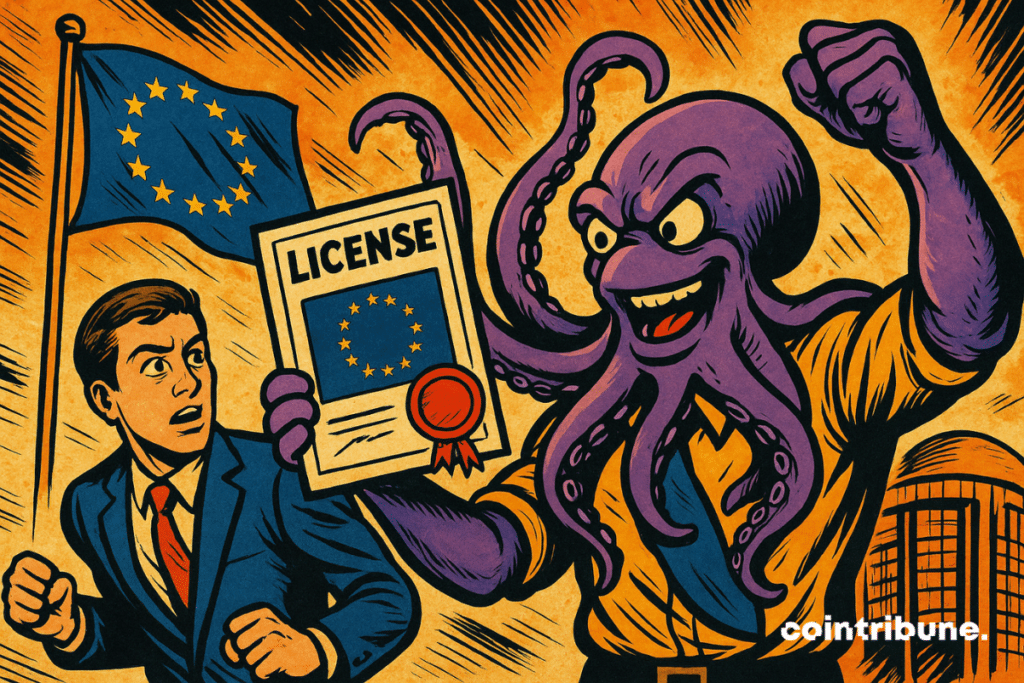Crypto: Kraken Validates Its MiCA License
Kraken, often discreet but never truly in the background, has just made a strategic move that could reshuffle the cards of the crypto market in Europe. By obtaining its regulatory license under the MiCA regime, the platform enters the big leagues on a continental scale, just behind Coinbase, but not far enough behind to be considered lagging. In a climate where compliance is becoming a key, Kraken chooses to embrace regulation rather than circumvent it. And this choice could pay off handsomely.

In brief
- Kraken obtains its MiCA license in Ireland, allowing it to operate throughout the European Union.
- This decision follows one week after Coinbase’s in Luxembourg, reigniting the race to crypto compliance.
- Thanks to this authorization, Kraken strengthens its European strategy with a regulated and accessible offer.
A unified crypto regulation, a new race among giants
In the crypto world, every day without a license is a lost day. Kraken has understood this well. By obtaining its official registration with the Central Bank of Ireland, the platform secures an entry ticket for the 27 countries of the European Union, within an increasingly demanding regulatory framework.
This announcement does not come by chance. A week earlier, Coinbase kicked off from Luxembourg. The goal? Quickly access the entire European market via a single jurisdiction. Kraken, which seemed behind, has just bounced back with a well-placed license. On equal footing, the platform war can truly begin.
The euro, long a quiet spectator in the crypto world, has become a key player: 17.5% of the global spot trading volume is now performed in euros. A figure that has more than doubled in one year. A clear signal that the European market is no longer marginal. It has become strategic. Kraken has clearly understood this.
MiCA: a united front, questionable foundations
The MiCA framework promises one thing: a uniform crypto regulation for the entire European area. On paper, it is a historic step forward. In reality, some cracks are already appearing.
The principle of the European passport allowing operation across the EU with a single national license is raising concerns. Some platforms might be tempted to choose countries with laxer oversight to then expand across the entire market.
This concern is not unfounded. The European Securities and Markets Authority is investigating the practices of certain jurisdictions, such as Malta, suspected of turning a blind eye to some strictness criteria. Meanwhile, Binance removes a series of non-compliant stablecoins from the European market, including USDT, proof that even the giants must yield to MiCA.
Kraken is not a newcomer in Europe. Even before this license, the crypto platform already had registrations in key countries: France, Italy, Spain, Netherlands… But this Irish authorization gives it continental legal coherence and optimized expansion capacity.
According to Arjun Sethi, co-CEO of Kraken, this step represents much more than an administrative green light. It is a fundamental building block in constructing a stable, regulated, and attractive offer, both for individuals and institutions. The message is clear: Kraken wants to woo banks, funds, and cautious investors. And with regulatory legitimacy now beyond question, it has the means.
Coinbase is therefore no longer alone in this European conquest. The dynamic is reversing, competition is toughening, and European users, long sidelined, are finally a coveted audience. And in this new crypto era, regulation is no longer an obstacle but a growth lever. Crypto is not dead, and Kraken intends to play a leading role.
Maximize your Cointribune experience with our "Read to Earn" program! For every article you read, earn points and access exclusive rewards. Sign up now and start earning benefits.

Fascinated by Bitcoin since 2017, Evariste has continuously researched the subject. While his initial interest was in trading, he now actively seeks to understand all advances centered on cryptocurrencies. As an editor, he strives to consistently deliver high-quality work that reflects the state of the sector as a whole.
The views, thoughts, and opinions expressed in this article belong solely to the author, and should not be taken as investment advice. Do your own research before taking any investment decisions.